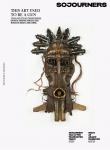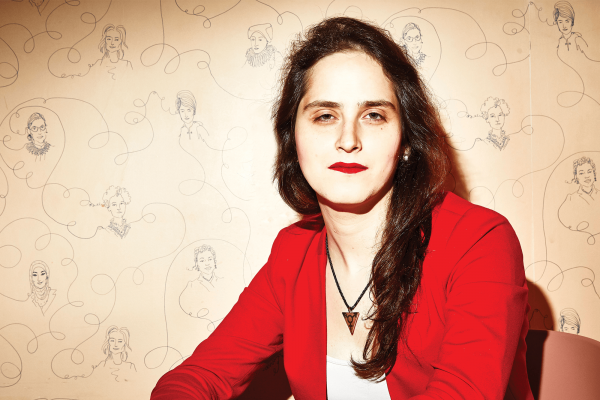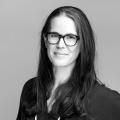IT'S A WARM September morning, and roughly 20 women are gathered in a women-only coworking space in Brooklyn. After brief introductions, a poem honoring the first month of the Muslim calendar, and a hymn from the Church of Jesus Christ of Latter-day Saints (widely known as the Mormon church), Abby Stein speaks about the upcoming Jewish High Holy Days.
Stein grew up in a strict Orthodox Jewish community and was assigned to be male at birth. From a young age, she says, she knew she was a girl, but didn’t have the vocabulary to describe what she was feeling. Gender roles were so strict in her community that, according to Stein, the concept of being gay or transgender simply didn’t exist.
“Forget separate roles,” Stein tells me. “Men and women aren’t even supposed to interact.”
For several years beginning when she was 9, Stein prayed every night that God would make her a girl while she slept. She began questioning her belief in God: “How can I trust my parents and teachers about something as big as God and religion that touches our entire lives when they could be mistaken about something so existential as who I am?”
Stein got married, was ordained as a rabbi, and had a son. But by her early 20s, it wasn’t working. She watched YouTube to learn English (she’d previously spoken only Yiddish and Hebrew), studied for her GED, and eventually left the community. She came out as transgender while an undergraduate at Columbia University and is now an activist in both transgender and formerly Orthodox communities.
Stein has found a new home in several LGBTQ-inclusive Jewish spaces, but she finds them limiting. “All of these communities, even the ones as progressive as they are, they still follow a very set tradition,” she says. At the September gathering, Stein discusses the biblical story of Ruth and her mother-in-law, Naomi, who share a deep love that some consider romantic. “If you ask me,” says Stein, with a half-joking grin, “everyone in the Bible is queer.”
Things are different at Sacred Space, a multifaith gathering that meets on the first Sunday of every month. The gathering is both a refuge for women who have left their religious traditions and a seminar for those who still hope to change their faith communities from within. No one religion is playing host. Everyone is welcome to bring their own traditions; only sexism, racism, homophobia, and other forms of exclusion are off the table.
Kicked Out
SACRED SPACE WAS founded by Kate Kelly and Eboni Marshall Turman, two women who have struggled against the male-dominated leadership of their faith traditions.
Kelly, who grew up in the Church of Latter-day Saints, began to question its strict gender hierarchy while serving on an 18-month mission in Barcelona. “This doesn’t make sense,” thought Kelly, then a student at Brigham Young University. “We do all the same things the male missionaries do, but we can’t perform any of the ordinances or be leaders in any capacity.”
She returned to Salt Lake City, married, and moved to Washington, D.C., to attend law school, but her questions remained. “It’s really difficult to look yourself in the mirror and acknowledge that you participate in an institution that discriminates against you,” she says.
In January 2013, Kelly founded Ordain Women, an organization dedicated to achieving gender equality in the Mormon church. She led a march down to Temple Square in Salt Lake City and asked to be let in to a priesthood session, which women are not allowed to attend.
She now laughs at her younger self for being “painfully” naive. A year and a half into her campaign, an all-male panel of church elders convicted Kelly of apostasy and excommunicated her. She was told she could only return if she gave up her feminist activism.
Today, Kelly lives in New York City and is a human rights lawyer for a gender equality nonprofit. She identifies as queer and is dating a woman. She no longer considers herself a Latter-day Saint, but when we meet for an interview at a cafe, Kelly is wearing a necklace made of 13 gold coins representing the church’s articles of faith. “I never actually left,” she explains. “I committed fully, and then they kicked me out.”
In 2018, Kelly met Marshall Turman, a womanist theologian and professor at Yale Divinity School who had left full-time work as a Baptist minister largely because of gender barriers in her church.
The women quickly swapped tales of the sexism and misogyny they had experienced in their faith traditions. Wouldn’t it be great, they said, if there were a place where they could practice the religions they loved, but without the sexism, racism, and homophobia? By the end of the conversation, Sacred Space was born.
Training Wheels
AT THE BEGINNING of Sacred Space, each woman introduces herself by sharing a little about her faith background. At the September gathering, the women identify themselves as Mormon, Jewish, Catholic, Shia Muslim, Eastern Orthodox, Methodist, and Pentecostal.
First-timer Emily Porter tells the group she recently left the Mormon church after coming out as queer. She doesn’t know what exactly she’s looking for, but one thing is clear: “I don’t want anyone telling me who or what God is,” she says.
Candace Taylor was raised Pentecostal. She’s a dancer and prefers to pray to God through movement. Today, she’s with a friend. “This is a space that is safe. I can invite people here and know that they’re not going to be judged,” says Taylor.
Ariella GH Khan was baptized Catholic, but she converted to Judaism, with her mother, when she was a young girl. She moved to New York from Brazil to attend the Jewish Theological Seminary to become a rabbi. After a research trip to Palestine, she converted to Islam.
“For me, who has been through literally every single Abrahamic religion, it’s a really comforting space, because I get to talk about all the parts of me that make me who I am,” Khan tells me later.
Khan is there with her mother, Marcelle Hohl, who is Jewish and studying to be a rabbi. The two women hold hands throughout the gathering.
Kelly loves the intimacy these introductions build among the women who attend.
“Many people would perceive me to be very tough and very confrontational, and that’s part of who I am,” she says. “But I also want this space to be vulnerable, to weep if necessary, to sing, to celebrate the softness and the sacredness.”
The category of religious “nones” in the U.S. has grown steadily over the past few decades, but polls show that “nones” are not necessarily atheists. Some may not agree with the faith traditions they grew up in, but that doesn’t mean they want to fully abandon those practices.
My friend Melanie Breault joined me on my first reporting trip to Sacred Space and has attended without me since. Breault grew up Jewish but hasn’t identified as religious for many years—she’d likely be described as a “none.” Sacred Space, she says, filled a spiritual need she didn’t know she had. Now she’s considering returning to Judaism. She’s not sure what it will look like, but she knows Sacred Space is part of the puzzle. “It’s like training wheels for my spirituality,” she explains. “I cry every time I go.”
An Old, Old Message
MARSHALL TURMAN, WHO was raised in black Baptist churches, believes many nones might return to traditional spaces if those spaces would update their gender and sexual politics.
“We’re still preaching this old, old, old message that really proclaims hopelessness” for those who don’t fit traditional gender norms, says Marshall Turman. “That’s why these churches are emptying out, and people are saying, ‘I’m spiritual but I’m not religious.’”
Marshall Turman wanted to preach at an early age, but never thought there would be a place for her. The leadership of the churches she attended was almost entirely male, and the few women who had power were white.
But after taking a theology class at Fordham University taught by a young black woman, she gained a new perspective. The professor “[proclaimed] God from the perspective of black women’s experiences and lives,” says Marshall Turman. “It completely took my world apart.”
Marshall Turman dove headfirst into womanist theology, earning her PhD from Union Theological Seminary. While there, she became the youngest woman ever ordained at the historic Abyssinian Baptist Church in Harlem. “It was still a man’s world,” she says. “I was an assistant minister, a pastor in the church, but I couldn’t go into certain meetings because I had the wrong genitalia.” The barriers became so frustrating that Marshall Turman left Abyssinian in 2012 to pursue a career in academia.
Unlike Kelly, Marshall Turman is still firmly rooted in her faith tradition. She attends church regularly, travels as an itinerant preacher all over the country, and still considers Abyssinian her home. “They can’t just vote me out,” she jokes. “It doesn’t work like that in a Baptist context.”
Feminist, Not Secular
AFTER THE INTRODUCTIONS, Sacred Space gatherings often include a song, sometimes even a dance, followed by reflections, prayers, and poetry readings. Each month, a speaker is invited to give a longer address on a spiritual topic.
The founders ensure each gathering represents diverse viewpoints—both in terms of who presents and who is present. Stein’s ideal is a “majority-minority” situation, where no single group dominates. Marshall Turman fears that the space “will become a white woman thing,” focusing solely on gender at the expense of race, class, and other systems of oppression. Elevating those who are marginalized should always be the central project of Sacred Space, she says. “Women are very much able to conceive of and practice evil as much as anybody else.”
Sacred Space isn’t trying to replace traditions; the gatherings wouldn’t work without the specific texts, practices, and communities that each woman brings. “We’re not just putting everything in a blender and mixing it up,” explains Marshall Turman. “We’re saying, ‘These are our traditions and we’re going to distinguish them and we’re also going to allow them to speak life to each other.’”
Sacred Space is also a refuge for feminist women who feel uncomfortable talking about faith and spirituality in secular progressive spaces. “You go to a lot of liberal spaces, and it’s very negative sometimes,” Khan tells me. “It’s not easy to be part of those communities if you have a strong spiritual side. I often feel looked down on.”
Kelly believes it’s hard for many women to come out as religious or ex-religious in feminist spaces because they’re often asked to defend the gender politics of their faith traditions. “Secular people have a hard time understanding religious people in any way that’s not super pejorative,” says Kelly.
At Sacred Space, Kelly can sing a hymn from the Church of Latter-day Saints just because she loves to sing that hymn.
“What we’re trying to do is honor who we are,” she says. “There is no space where I can be Mormon but not Mormon in quite the same way.”

Got something to say about what you're reading? We value your feedback!







